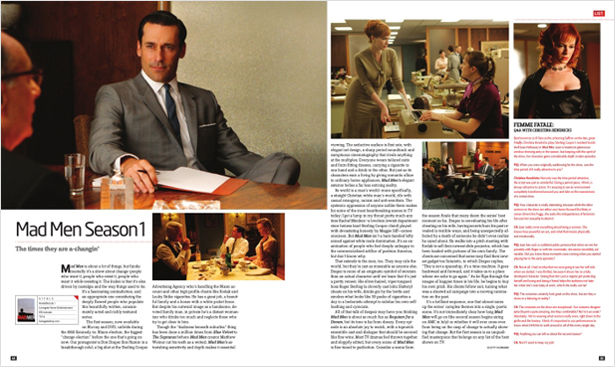






Mad Men Season 1 The times they are a-changin’ Mad Men is about a lot of things, but fundamentally it’s a show about change–people who want it, people who resist it, people who want it while resisting it. The kicker is that it’s also driven by nostalgia and the way things used to be. It’s a fascinating contradiction, and an appropriate one considering the deeply flawed people who populate this beautifully written, consummately acted and richly textured series. The first season, now available on Blu-ray and DVD, unfolds during the 1960 Kennedy vs. Nixon election, the biggest “change election” before the one that’s going on now. Our protagonist is Don Draper (Jon Hamm in a breakthrough role), a big shot at the Sterling Cooper Advertising Agency who’s handling the Nixon account and other high profile clients like Kodak and Lucky Strike cigarettes. He has a great job, a beautiful family and a house with a white picket fence. But despite his outward image as a handsome, devoted family man, in private he’s a distant womanizer who drinks too much and neglects those who try to get close to him. Though the “darkness beneath suburbia” thing has been done a million times from Blue Velvet to The Sopranos (where Mad Men creator Matthew Weiner cut his teeth as a writer), Mad Men’s astonishing sensitivity and depth makes it essential viewing. The seductive surface is first rate, with elegant set design, a sharp period soundtrack and sumptuous cinematography that rivals anything at the multiplex. Everyone wears tailored suits and form-fitting dresses, carrying a cigarette in one hand and a drink in the other. But just as its characters earn a living by giving romantic allure to ordinary home appliances, Mad Men’s elegant exterior belies a far less enticing reality. Its world is a man’s world, more specifically a straight Christian white man’s world, rife with casual misogyny, racism and anti-semitism. The systemic oppression of anyone unlike them makes for some of the most heartbreaking scenes in TV today; I get a lump in my throat pretty much any time Rachel Menken, a lovelorn Jewish department store heiress (and Sterling Cooper client) played with devastating honesty by Maggie Siff, comes onscreen. But Mad Men isn’t a ham-handed lefty screed against white male domination. It’s an examination of people who feel deeply unhappy in the commercialized artifice of post-war America, but don’t know why. That extends to the men, too. They may rule the world, but they’re just as miserable as anyone else. Draper is more of an enigmatic symbol of stoicism than an actual character until we learn that it’s just a pretty veneer. His silver-haired, viper-tongued boss Roger Sterling (a cleverly cast John Slattery) cheats on his wife, drinks gin by the bottle and smokes what looks like 30 packs of cigarettes a day in a hedonistic attempt to subdue his own self-loathing and cynicism. All of that talk of despair may have you thinking Mad Men is about as much fun as Requiem For A Dream, but its tone is far from dreary. Every episode is an absolute joy to watch, with a top-notch ensemble cast and dialogue that should be savored like fine wine. Most TV dramas feel thrown together and sloppily edited, but every scene of Mad Men is fine tuned to perfection. Consider a scene from the season finale that many deem the series’ best moment so far. Draper is reevaluating his life after cheating on his wife, having secrets from his past revealed in terrible ways, and being unexpectedly affected by a death of someone he didn’t even realize he cared about. He walks into a pitch meeting with Kodak to sell their newest slide projector, which has been loaded with pictures of his own family. The clients are concerned that some may find their newest gadget too futuristic, to which Draper replies, “This is not a spaceship, it’s a time machine. It goes backwards and forwards, and it takes us to a place where we ache to go again.” As he flips through the images of happier times in his life, he begins to buy his own pitch. His clients follow suit, turning what was a shrewd ad campaign into a moving rumination on the past. It’s a brilliant sequence, one that almost sums up the series’ complex themes into a single, poetic scene. It’s not immediately clear how long Mad Men will go on (the second season begins airing on AMC later this month) or whether it will ever cross over from being on the cusp of change to actually showing that change. But the first season is an unqualified masterpiece that belongs on any list of the best shows on TV. |
| © copyright scott howard |
 July 2008
July 2008